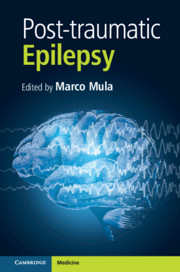Book contents
- Post-traumatic Epilepsy
- Post-traumatic Epilepsy
- Copyright page
- Contents
- Contributors
- Foreword
- Preface
- Chapter 1 Neurobiological Aspects of Post-traumatic Epilepsy: Lessons from Animal Models
- Chapter 2 Post-traumatic Epilepsy: Epidemiology, Definition and Terminology
- Chapter 3 Traumatic Brain Injury: The Acute Management and Prevention Programmes
- Chapter 4 Critical Care Management of Traumatic Brain Injury
- Chapter 5 Post-traumatic Epilepsy in Children
- Chapter 6 Sport-related Concussive Convulsions
- Chapter 7 Accidents and Injuries during Seizures
- Chapter 8 Cognitive Rehabilitation of Traumatic Brain Injury and Post-traumatic Epilepsy
- Chapter 9 Neuropsychiatric Consequences of Moderate to Severe Traumatic Brain Injury
- Chapter 10 Traumatic Brain Injury and Psychogenic Nonepileptic Seizures
- Chapter 11 Post-traumatic Epilepsy and Post-traumatic Stress Disorder
- Chapter 12 Antiepileptogenic Therapies for Post-traumatic Epilepsy: Is There Any Evidence?
- Chapter 13 Effects of Antiepileptic Drugs on Cognition
- Chapter 14 Post-traumatic Epilepsy in Low Income Countries
- Index
- References
Chapter 13 - Effects of Antiepileptic Drugs on Cognition
Published online by Cambridge University Press: 10 August 2021
- Post-traumatic Epilepsy
- Post-traumatic Epilepsy
- Copyright page
- Contents
- Contributors
- Foreword
- Preface
- Chapter 1 Neurobiological Aspects of Post-traumatic Epilepsy: Lessons from Animal Models
- Chapter 2 Post-traumatic Epilepsy: Epidemiology, Definition and Terminology
- Chapter 3 Traumatic Brain Injury: The Acute Management and Prevention Programmes
- Chapter 4 Critical Care Management of Traumatic Brain Injury
- Chapter 5 Post-traumatic Epilepsy in Children
- Chapter 6 Sport-related Concussive Convulsions
- Chapter 7 Accidents and Injuries during Seizures
- Chapter 8 Cognitive Rehabilitation of Traumatic Brain Injury and Post-traumatic Epilepsy
- Chapter 9 Neuropsychiatric Consequences of Moderate to Severe Traumatic Brain Injury
- Chapter 10 Traumatic Brain Injury and Psychogenic Nonepileptic Seizures
- Chapter 11 Post-traumatic Epilepsy and Post-traumatic Stress Disorder
- Chapter 12 Antiepileptogenic Therapies for Post-traumatic Epilepsy: Is There Any Evidence?
- Chapter 13 Effects of Antiepileptic Drugs on Cognition
- Chapter 14 Post-traumatic Epilepsy in Low Income Countries
- Index
- References
Summary
Patients with traumatic brain injury frequently develop epilepsy, cognitive dysfunction and behavioral imbalance. Understanding the interplay between antiseizure medications, mood and cognition is essential to any provider who cares for patients with TBI and seizures. Antiseizure medications can be classified into those that have low, moderate and high cognitive side effect profiles, and they can also be classified into medications that cause positive, intermediate and negative effects on mood. For example, Lamotrigine is a medication that both has low cognitive side effects and has positive effects on mood. But there is no drug without side effects, and each antiseizure medication has its own unique side effect profile. Choosing the antiseizure medication that will lead to the best outcomes for each individual patient requires evaluating the unique characteristics of each medication. Only with an understanding of the cognitive and behavioral effects of each medication is it possible to create a successful treatment regimen for each individual. This chapter will examine many antiseizure medications and their unique side effect profiles, with a focus on the cognitive and behavioral implications of each medication.
- Type
- Chapter
- Information
- Post-traumatic Epilepsy , pp. 169 - 178Publisher: Cambridge University PressPrint publication year: 2021



